Во всех сервисах используется инструмент линейки, с помощью которой можно рассчитать путь по прямой или ломаной линии.
Google Карты
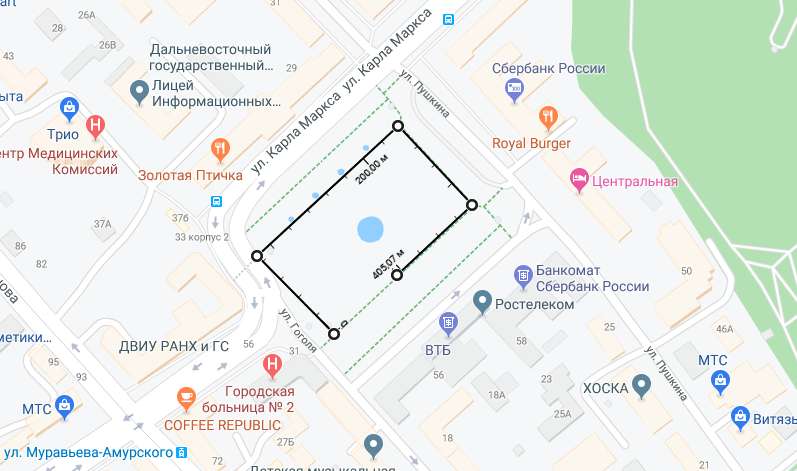
- Наведите курсор на начальную точку и нажмите правую кнопку мыши. В меню выберите Измерить расстояние.
- Укажите на карте вторую точку, нажав левую кнопку мыши. Точно так же можно добавить ещё несколько точек.
- При необходимости вы можете перетащить точку в другое место или удалить, нажав на неё.
- На карточке в нижней части страницы будет указана общая протяжённость пути в километрах и милях.
- Когда закончите, нажмите на значок Закрыть.
Яндекс Карты
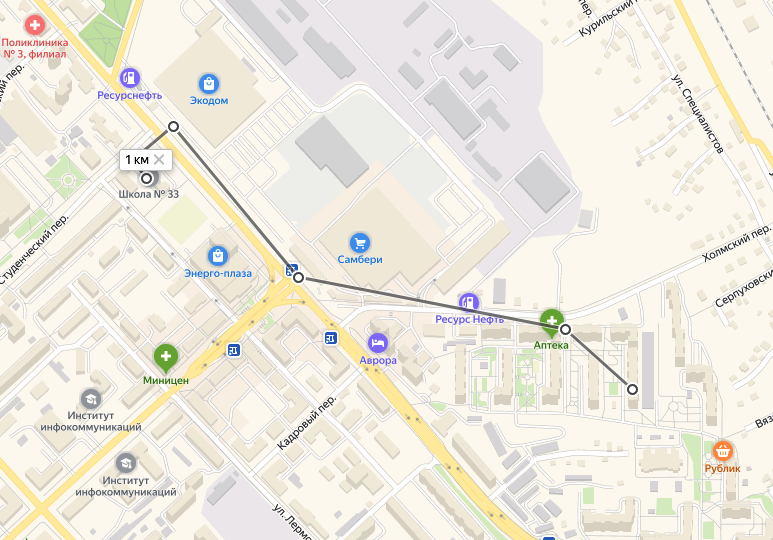
- Нажмите кнопку Линейка.
- Установите начальную точку измеряемого отрезка.
- Поставьте следующую точку измеряемого отрезка.
- Укажите последующие точки измеряемой линии. Возле последней точки отображается длина всей заданной линии.
- Вы можете узнать расстояние от начала маршрута до любой установленной точки. Для этого наведите указатель на эту точку.
- Полученную линию можно откорректировать, перетащив любую из точек на новое место.
- Чтобы удалить точку — дважды нажмите на неё мышью.
- Чтобы удалить линию целиком — нажмите крестик возле конечной точки.
2GIS Карты
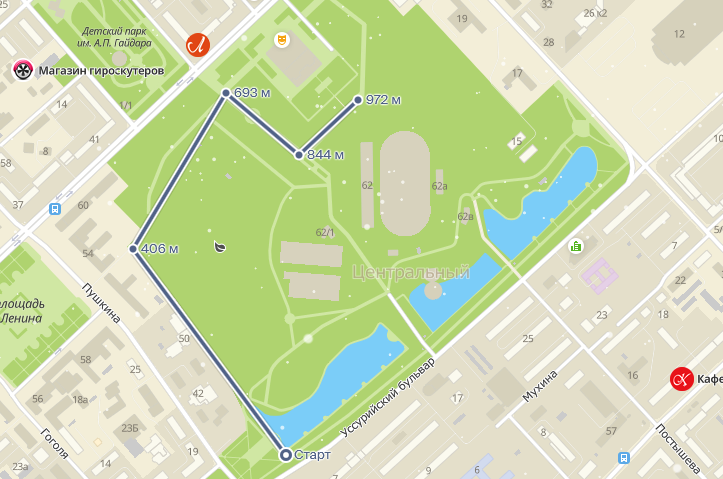
- Кликните на значок линейки в правом верхнем углу карты.
- Кликами левой кнопки мыши укажите нужные точки на карте. Можно задать любое необходимое вам количество промежуточных точек, линейка измерит расстояние от начального до конечного пункта.
- Чтобы удалить любой из сегментов линейки, нажмите на крестик в окне с отображением расстояния.
- Чтобы выйти из режима, снова нажмите на кнопку с изображением линейки.
Рассчитать расстояние между городами на карте можно, используя различные онлайн-сервисы. Помимо карты маршрута, километража и времени в пути, они также покажут примерный расход и стоимость топлива для загородной поездки на автомобиле.
Измеряем расстояния по прямой между точками на Гугл Картах
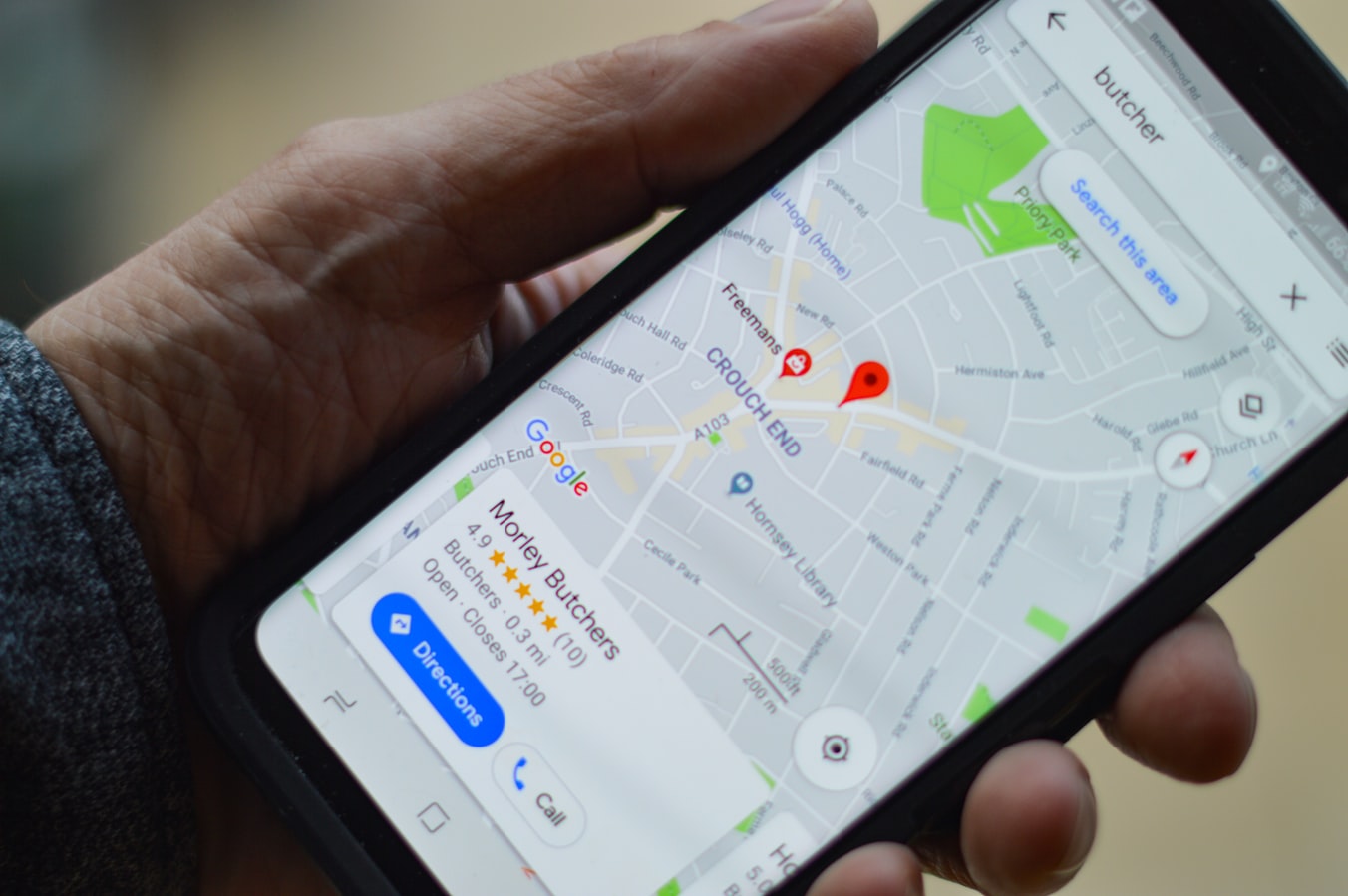
Пользователи знают, что через сервис онлайн-карт Google Maps (Гугл Карты) легко узнать расстояние до ближайшей точки на карте. Например, как далеко от вашего дома находится какой-нибудь магазинчик или ресторан или сколько времени займет поездка из Москвы в Красноярск? На эти вопросы ответят в Google или Yandex онлайн-картах без проблем.
Однако бывают случаи, когда необходимо оценить расстояние между двумя точками на карте без учета извилистых дорог, и такой, казалось бы, простейший вариант замера расстояния между точками на онлайн-карте может вызвать определенные сложности. А между тем выход есть: способ измерения расстояний по кратчайшему пути между точками на карте достаточно прост и доступен на всех устройствах. Неважно, используете вы десктоп или устройство под управлением Android или iOS . Вот как это работает:
Как измерить расстояния на компьютере с Windows
На браузере компьютера откройте «Гугл Карты».

Щелкните правой кнопкой мыши на начальной точке на карте.

Выберите пункт «Измерить расстояние».
Теперь щелкните в любом месте карты кликом левой кнопки мыши, чтобы приложить виртуальную линейку для измерения отрезка пути.
Чтобы добавить еще одну точку на карте, щелкните в любом ее месте левой кнопкой мыши (кликать можно неограниченное количество раз).
Дополнительно: при необходимости вы можете перетащить точку в другое место или удалить, нажав на нее.
Внизу вы увидите общее расстояние в километрах (км) и милях (мил.).
Когда закончите, на карточке внизу Нажмите кнопку x.
Как измерить расстояние через Google Карты на Android
Откройте приложение Google Maps.
Тапните и удерживайте в любом месте на карте. Вы увидите – появится красная булавка.
Нажмите на название места в нижней части экрана.
На странице места прокрутите вниз и выберите пункт «Измерить расстояние».
Добавление дополнительных точек
Переместите карту таким образом, чтобы черный кружок (крестик) оказался в точке, расстояние до которой нужно измерить.
В правом нижнем углу нажмите Добавить.
Добавьте остальные точки.
На экране внизу вы также увидите общее расстояние в километрах и милях.
Чтобы удалить последнюю точку, нажмите «Отменить». Чтобы очистить все точки, в правом верхнем углу экрана выберите «Еще» > «Очистить».
Как измерить расстояние на iOS
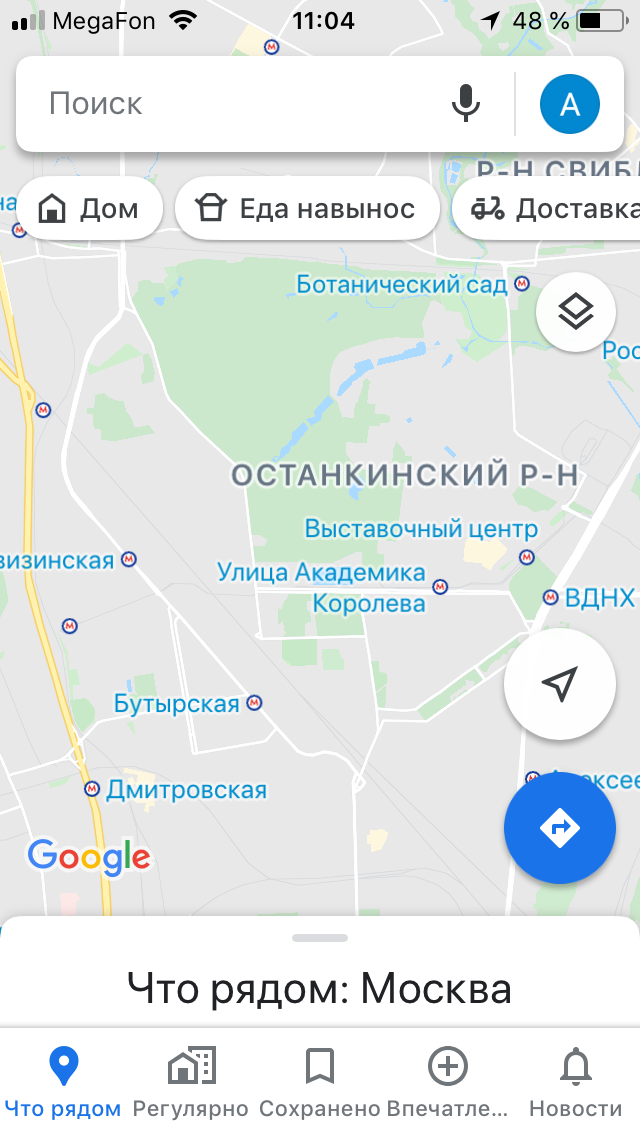
Аналогичным способом можно измерять расстояния на устройствах iOS.
Откройте приложение Google Maps («Google Карты») на iPhone или iPad ;
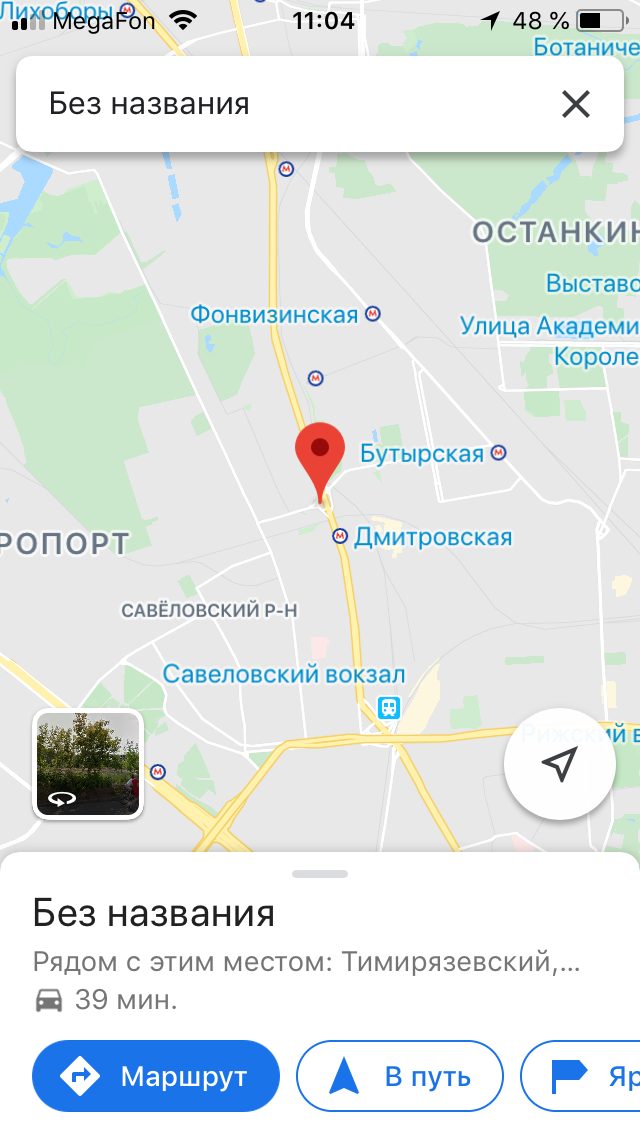
Нажмите и удерживайте в любом месте на карте, пока не появится красный маркер.
Нажмите на название места в нижней части экрана.

Прокрутите страницу места вниз и выберите «Измерить расстояние».
Переместите карту таким образом, чтобы черный кружок (крестик) оказался в точке, расстояние до которой нужно измерить.
В правом нижнем углу экрана нажмите на значок «Добавить».
Добавьте остальные точки.
Обложка: henry perks / unsplash.com
Download Article
Download Article
Maps provide you with an accurate picture of a geographic area so you can determine how far it is from one place to another. Maps provide a fractional scale that tells you the ratio between the distance on the map and the real-world distance. With the fractional scale, you simply have to multiply the map distance by the scale value to find the real-world distance. However, fractional scales don’t work for digital maps that can change size, such as maps you might pull up on a smartphone or tablet. For those maps, use the bar scale located at the bottom of the map to measure the distance from one place to another.[1]
-

1
Mark the 2 points on the edge of a sheet of paper. Take a blank sheet of paper and line up the edge between the 2 points that you want to measure the straight-line distance between. Make a tick mark on the paper for the first point, then another tick mark for the second point.[2]
- It’s helpful to label each of the 2 points so you remember which tick mark goes where, but this isn’t strictly necessary since the distance will be the same in either direction.
-

2
Place your paper underneath the map’s bar scale. The bar scale is a black or gray bar, typically at the bottom of the map. Place the tick mark for the first point directly under the 0 on the bar scale.[3]
- The 0 might not be all the way on the left edge of the bar scale. Some bar scales include fractional distances to the left of the 0.
- Bar scales typically have distance measurements in both kilometers and miles, so make sure you’re on the right one. The units used locally will likely be the most helpful since road signs would be in the same units. However, if you’re not familiar with that system, you might want to get a measurement with both.[4]
Advertisement
-

3
Read the distance between the 2 points on the scale. Locate the tick mark you made for the second point on your piece of paper and look at the bar scale. The number above that tick mark on the bar scale is the real-world distance between the 2 points.[5]
- For example, suppose you have a 10-kilometer bar scale that’s marked off in 2-kilometer segments. The number over your tick mark is 8. Therefore, your 2 points are 8 kilometers apart.
- If there isn’t a number directly over the tick mark, you’ll have to estimate. Some bar scales have fractional distances to the left of the 0 that will help you to estimate. For example, suppose you have a 10-kilometer scale that isn’t segmented, but your tick mark is halfway between the 0-point and the end. Your points are approximately 5 kilometers apart.
-

4
Create segments if your distance is longer than the bar scale. Most distances you try to measure will be longer than the bar scale, but you can still measure them. Make a tick mark on your paper where the bar scale ends and write the distance underneath it. Then, slide your paper over so the tick mark you just made is directly under the 0 on the bar scale.[6]
- If the second point is still further than the scale, make another tick mark and move the paper over again. Keep going like that until you reach your destination.
-

5
Add up your segments to determine the total distance. For distances that are longer than the bar scale on the map, take the distance represented by each of the segments you made and add them all together. That tells you the total distance from the first point to the second point.[7]
- For example, suppose you have a 10-kilometer bar scale. You’ve measured 3 10-kilometer segments and one segment you estimate to be half of the bar scale, or 5 kilometers. Your total distance between the points would be 35 kilometers (10 + 10 + 10 + 5).
Advertisement
-

1
Look for the fractional scale on the map. A fractional scale, as the name implies, is expressed as a fraction, typically at the bottom of the map. Sometimes, it’s also expressed as a ratio, but the calculations are the same regardless.[8]
- Maps have different scales for different purposes. For example, a road map is typically drawn at a 1:250,000 scale. It shows a larger area with roads and towns, more suitable for driving. A walking map, on the other hand, might be drawn at a 1:25,000 scale, providing more detail about paths and landmarks in a smaller area.
-

2
Measure the map distance between the 2 points. Use a ruler as a straight edge between the 2 points you want to find the straight-line distance between. Place the 0-edge of the ruler at the first point, then mark the measurement listed at the second point.[9]
- Since you’re using a fractional scale, the number you find becomes the numerator, or top number, of your fraction. If you’re using a road map drawn to a 1/250,000 scale, and the distance between your 2 points is 5, your 5 takes the position of the 1 on the scale. Then, you’ll have to find the total ground distance that represents.
-

3
Cross-multiply by the scale to find the ground measurement. Set up your fraction so that the unit measurement you found is the numerator and “x” is your denominator. Multiply the denominator of the scale by the unit measurement you found to determine the ground measurement.[10]
- To continue with the previous example, if you found 5 as the distance between your 2 points, you would multiply 5 by 250,000 to get 1,250,000. So if you used inches, the 2 points are 1,250,000 inches apart from each other. Similarly, if you used centimeters, the 2 points are 1,250,000 centimeters apart from each other. The unit makes no difference.
-

4
Convert your answer into the unit of your choice. The fractional scale tells you the real-world distance in centimeters or inches. To make your answer more usable, divide centimeters by 100 for meters or 100,000 for kilometers. If you’re working in inches, divide by 12 to find feet or 63,360 to find kilometers.[11]
- For example, you would be unlikely to say that 2 points were 1,250,000 centimeters apart. Instead, you would likely want to convert those centimeters to meters or kilometers. When you did so, you would find that the 2 points are 12,500 meters (1,250,000/100) or 12.5 kilometers (1,250,000/100,000).
- Similarly, if you used inches, the 2 points would be 1,250,000 inches apart, which converts to approximately 104,167 feet (1,250,000/12) or 19.7 miles (1,250,000/63,360).
Advertisement
-

1
Identify the road or roads between the 2 points. Place your finger on the starting point and find a road that goes in the direction of your ending point. Trace your finger down the road to find the route you would need to take between the 2 points.
- You may need to take more than one road — especially if the 2 points are far away from each other. To keep track of your route, trace it in pencil or take notes on a separate sheet of paper.
-

2
Place a string along the route. Put the end of the string at the first point and lay it down directly over the roads you would take if you were traveling to the other point. For curves, hold the string to follow the curve and then move your finger to the furthest point.[12]
- It can help if you have a friend with you to help you hold the string. However, you don’t need to hold it down all the way from the beginning. If you’re going around a curve, just make sure you’re holding down the string at the furthest spot you’ve gone so far.
-

3
Measure the total length of your string. Hold the string at the point where it reaches the second point. The length of the string from the end to that spot represents the road distance on the map. Use a ruler or tape measure to get the total length of the string.[13]
- You can also mark the string with a pen or use a piece of tape. That way, you don’t have to worry about dropping the string and losing your spot.
-

4
Use the bar scale to measure your string if you don’t have a ruler. Get something to take notes so you can keep track of segments, then place the start of the string at the 0-point of the map’s bar scale. Extend the string to the end of the bar scale and place your finger there. Right down the distance represented by the full length of the bar scale, then move the place where your finger is to the 0-point of the bar scale and do it again. Keep going until you reach the place on your string that marked your destination.[14]
- For example, suppose the map has a bar scale that’s 8 kilometers long. Your string has 4 segments the length of the bar scale, plus another segment about half the length of the bar scale before you reach the spot on the string for your destination. The distance between the 2 points is 36 kilometers (8 x 4 + 4).
- Be careful not to stretch the string any tighter than you did when you were measuring, or your final distance measurement will be off.
-

5
Calculate the distance using the map’s scale. If you measured your string with a ruler, use the map’s fractional scale to find out the real-world distance by multiplying the string’s measurement by the number in the denominator of the fraction or right side of the ratio. Then, convert that number to a larger unit, such as miles or kilometers.[15]
- For example, suppose you found your string is 7 centimeters long and the map you’re using has a scale of 1:250,000. Multiplying 7 by 250,000 gives you a real-world distance of 1,750,000 centimeters, which is likely not very helpful. If you divide that number by 100,000, however, you find that your points are 17.5 kilometers apart.
- If you used the bar scale to find the length of your string, you don’t need to do this step because you already have the real-world distance.
-

6
Use a piece of paper to measure segments if you don’t have string. A string is ideal to measure a curvy road because it can follow the curves of the road. If you don’t have a string handy, take a piece of paper and make a tick mark on the edge at your starting point. Then, follow the road until it curves. Place a tick mark at the curve, then pivot the paper until it’s following the road again, holding it in place where you marked the curve. Mark the spot where it curves again and follow the same procedure until you reach the endpoint on the map, always keeping the edge of your paper against the road edge.[16]
- When you get done, you’ll have multiple tick marks on the edge of your sheet of paper. Hold these to the scale to find the distance for each segment. Then, add them together to find the distance between the 2 points.
- This method may not be as accurate as the string method, but in a pinch, it’s better than nothing.
Advertisement
Ask a Question
200 characters left
Include your email address to get a message when this question is answered.
Submit
Advertisement
Video
-
If you’re looking at a map that doesn’t have a scale, look for something you know the size of, such as a football field, then measure its length on the map. Once you have those 2 distances, you can find the scale for the map.[17]
Thanks for submitting a tip for review!
Advertisement
-
If you’re looking at a digital copy of a map on a smartphone or tablet, any fractional scale listed won’t be valid because the size of the map has changed from the original. However, the bar scale will still be valid.[18]
Advertisement
References
About This Article
Thanks to all authors for creating a page that has been read 31,257 times.
Did this article help you?
Get all the best how-tos!
Sign up for wikiHow’s weekly email newsletter
Subscribe
You’re all set!
